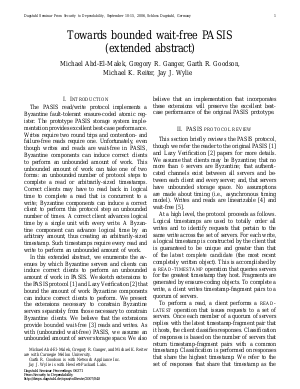Towards bounded wait-free PASIS
Authors Michael Abd-El-Malek, Gregory R. Ganger, Garth R. Goodson, Michael K. Reiter, Jay J. Wylie
-
Part of:
Volume:
Dagstuhl Seminar Proceedings, Volume 6371
Part of: Series: Dagstuhl Seminar Proceedings (DagSemProc) - License:
 Creative Commons Attribution 4.0 International license
Creative Commons Attribution 4.0 International license
- Publication Date: 2007-01-10
File

PDF
DagSemProc.06371.5.pdf
- Filesize: 51 kB
- 4 pages
Document Identifiers
Subject Classification
Keywords
- Byzantine fault-tolerant
- erasure-coded storage
- bounded wait-free
- non-skipping timestamps
Metrics
- Access Statistics
-
Total Accesses (updated on a weekly basis)
0Document
0Metadata
Abstract
The PASIS read/write protocol implements a Byzantine fault-tolerant erasure-coded atomic register. The prototype PASIS storage system implementation provides excellent best-case performance. Writes require two round trips and contention- and failure-free reads require one. Unfortunately, even though writes and reads are wait-free in PASIS, Byzantine components can induce correct clients to perform an unbounded amount of work. In this extended abstract, we enumerate the avenues by which Byzantine servers and clients can induce correct clients to perform an unbounded amount of work in PASIS. We sketch extensions to the PASIS protocol and Lazy Verification that bound the amount of work Byzantine components can induce correct clients to perform. We believe that the extensions provide bounded wait-free reads and writes. We also believe that an implementation that incorporates these extensions will preserve the excellent best-case performance of the original PASIS prototype.
Cite As Get BibTex
Michael Abd-El-Malek, Gregory R. Ganger, Garth R. Goodson, Michael K. Reiter, and Jay J. Wylie. Towards bounded wait-free PASIS. In From Security to Dependability. Dagstuhl Seminar Proceedings, Volume 6371, pp. 1-4, Schloss Dagstuhl – Leibniz-Zentrum für Informatik (2007)
https://doi.org/10.4230/DagSemProc.06371.5
BibTex
@InProceedings{abdelmalek_et_al:DagSemProc.06371.5,
author = {Abd-El-Malek, Michael and Ganger, Gregory R. and Goodson, Garth R. and Reiter, Michael K. and Wylie, Jay J.},
title = {{Towards bounded wait-free PASIS}},
booktitle = {From Security to Dependability},
pages = {1--4},
series = {Dagstuhl Seminar Proceedings (DagSemProc)},
ISSN = {1862-4405},
year = {2007},
volume = {6371},
editor = {Christian Cachin and Felix C. Freiling and Jaap-Henk Hoepman},
publisher = {Schloss Dagstuhl -- Leibniz-Zentrum f{\"u}r Informatik},
address = {Dagstuhl, Germany},
URL = {https://drops.dagstuhl.de/entities/document/10.4230/DagSemProc.06371.5},
URN = {urn:nbn:de:0030-drops-8488},
doi = {10.4230/DagSemProc.06371.5},
annote = {Keywords: Byzantine fault-tolerant, erasure-coded storage, bounded wait-free, non-skipping timestamps}
}
